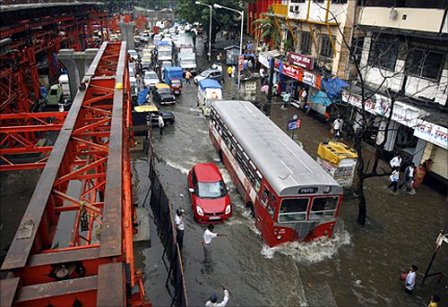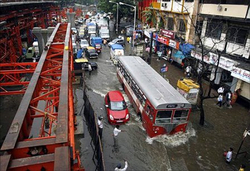ICLEI ACCCRN Process – Helping cities in strengthening awareness of potential climate risks

Watch out this space for the toolkit which will be released soon!
Cities as centres of economic activities cater to half of the world’s population – and this share is growing. Not only as centres of growth but also as major consumers of resources, urban areas are one of the major emitters of greenhouse gases. In addition, these global emissions are leading to climate change and variability causing adverse impacts at the local level in terms of disruptions and damages to physical, social, economic, and environmental systems. Cities are therefore both the cause and the victims of climate change.
The ICLEI ACCCRN Process (IAP) has been developed by ICLEI – Local Governments for Sustainability’s South Asia and Oceania offices through involvement with the Rockefeller Foundation supported Asian Cities Climate Change Resilient Network (ACCCRN) program. It enables local governments to assess their climate risks in the context of urbanisation, poverty and vulnerability and formulate corresponding resilience strategies.
With a strong city focus, this toolkit, which was tested in three Indian cities – Shimla, Bhubaneswar, and Mysore – and subsequently used in a range of cities in Indonesia, Bangladesh, the Philippines and India, is targeted at city governments and their role in catalysing community building. It provides a streamlined process that is simple and yet rigorous, and which can be implemented by the cities themselves, with only minimal need for external support. It enables local governments to assess their climate risks, formulate and implement corresponding resilience strategies through a process of shared learning with local stakeholders.
The ICLEI ACCCRN Process has been designed in a step-by-step format, divided into 6 phases:
- Engagement – Phase 1 of the process will provide all the tools and activities needed to start work with the city. The tools help local governments gain the necessary political and administrative support, establish a climate core team, involve local stakeholders, appropriately share relevant information through a tailored communications plan, and conduct an initial assessment of the city’s progress towards dealing with climate change. The cities which are currently in this phase are Leh, Kurseong, Dharamsala and Gangtok (India).
- Climate Research and Impacts Assessment – In Phase 2 the main impacts of climate change faced by the city are identified through shared learning dialogues and interactions with the climate core team. The fragile urban systems facing climate threats are also identified and prioritised according to their risk status. The cities which are currently in this phase are Mandi (India), Mongla (Bangladesh) and Singra (Bangladesh).
- Vulnerabilities Assessment – Phase 3 will assist the city government in producing climate vulnerability hotspot maps, in identifying the vulnerable social groups, and in analysing their adaptive capacities as well as those of the impacted urban systems. The cities which are currently in this phase are Panaji (India), Barisal (Bangladesh) and Shillong (India).
- City Resilience Strategy – In Phase 4, city governments will use the information and analysis from the previous Phases to develop a list of potential resilience building interventions. The tools in this phase help screen and prioritise these interventions, link them to existing city plans, and compile all the information into a City Resilience Strategy. Nashik (India) is currently the only city in this phase.
- Implementation – This phase includes the implementation of the resilience strategy that was developed in phase 4 and includes identification of funding options for the strategies, project planning and project implementation. The cities which are currently in this phase are Bhubaneswar, Mysore and Shimla (India).
- Monitoring and Review – This phase comes only after the project is implemented and some resilience building activities have been undertaken. In this phase, the city develops performance indicators and a reporting system to monitor the resilience building actions taken up by the city and their impact, so the IAP methodology can be iterated with improvements and updated information in the next stage of the IAP application in the city.
The toolkit for IAP developed by ICLEI includes tools for up to phase 4 in the process. The cities can use this kit to develop their strategies. Implementation of the strategies are to be undertaken by the local governments through their own funding resources, or by accessing other government or non government funding schemes.
ACCCRN, the Asian Cities Climate Change Resilience Network funded by the Rockefeller Foundation, was initiated in early 2009. It is a network of ten cities in India, Indonesia, Thailand and Vietnam, experimenting with various activities that together aim at improving the ability of these cities to withstand and prepare for the projected impacts of climate change.
Read more about the South Asian activities of the ACCCRN project here.
